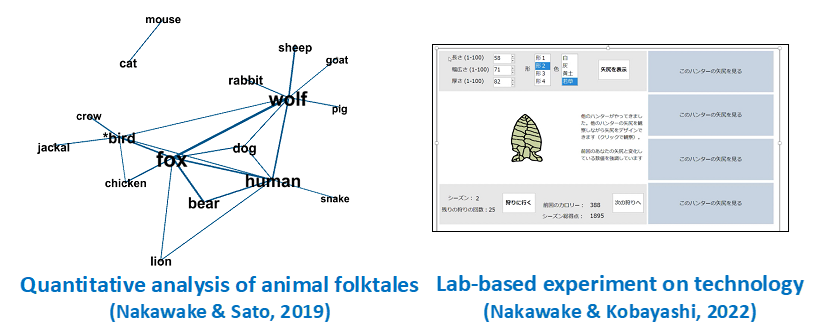
Exploring the psychological foundation of cultural and technological complexity
Human Behaviour and Cultural Evolution Lab
Associate Professor:NAKAWAKE Yo
E-mail:
[Research areas]
psychology, cultural informatics, cognitive anthropology, folkloristics
[Keywords]
social psychology, cultural evolution, norms, technological evolution, cognitive anthropology, collective decision, religion, narratives, cognitive information strategies, scientometrics
Skills and background we are looking for in prospective students
We prioritize efficiency, continuous learning, and openness to advice. Members are encouraged to think outside the box, embrace new challenges, and value the ongoing education. While a basic understanding of programming, statistics, and psychological experiments is advantageous, we welcome everyone who are eager to develop new skills during their time with us.
What you can expect to learn in this laboratory
Our lab explores the complexities of society and culture, acknowledging the inherent ambiguity in expressing them through natural language. Through model-based thinking, we refine our ability to intellectually analyze phenomena, abstracting and simplifying them for deeper understanding. Our research methods encompass psychological experiments, computer simulations, cultural data analysis, field studies and quantitative text analysis. Embracing the old saying ‘the devil is in the details’, we carefully examine prior studies, paying close attention to exact experimental and statistical procedures. At the same time, we cultivate the skill of quickly navigating diverse fields of literature.
【Job category of graduates】 IT, education, management, research, and other industries.
Research outline
Primary Research Focus
Our lab focuses on employing methodologies from psychology (primarily social and experimental psychology) and cultural informatics to empirically elucidate the relationship between culture and human society. To do so, we employed various research methods such as laboratory experiments, social surveys, quantitative text analysis, computer simulations, and field experiments. Following cultural evolution theory, we define culture as an ‘information or knowledge system socially transmitted’. Our research primarily targets the following three broad themes:
- Stories (e.g., fiction, rumours, folklore, fake news)
- Technologies (e.g., projectiles, robots, artificial intelligence, technological investment)
- Belief systems (e.g., superstitions, religions, rituals, moral norms)
(Note: My expertise lies in psychology; however, topics like mental health or workplace motivation are outside my specialization, making it challenging to provide research assistance. However, if you could formulate those topics in a theoretical format such as mathematical models [e.g., game theory, rational choice theory], our lab might be possible to support your research.)
Addressing Contemporary Issues
We are particularly interested in the ethical implications and benefits brought about by artificial intelligence, and how those could influence our belief systems (or vice versa). Additionally, we are interested in meta-research on science and technology themselves as one form of culturally transmitted informational units (we approach innovation in science and technology as an exploration problem of fitness landscapes). As applied research of narratives and belief systems, we are interested in cognitive information strategies such as the manipulation of information in social and media spaces, including rumors and fake news.
We are also interested in applying theories and analytical methods from ecology (e.g., community ecology, mathematical ecology, behavioral ecology) to cultural studies. For instance, we focus on areas such as biodiversity indices, population dynamics, and optimal foraging theory. We collaborate with ecologists to conduct research that applies ecological principles to culture, aiming to examine the biocultural diversity encompassing not only flora and fauna but also human cultural behavior, with a goal of contributing to sustainable societies.
In addition to the aforementioned topics, we are also interested in studying the cultural evolution of corporate culture, regional culture, or social institutions (e.g., voting systems). Additionally, we explore the evolution of culture in various domains ranging from martial arts, fashion, dance, painting, to subculture. We are willing to apply data science and artificial intelligence to research in various humanities and social science disciplines.

Key publications
- Nakawake, Y., & Sato, K.(2019). Systematic quantitative analyses reveal the folk-zoological knowledge embedded in folktales. Palgrave Communications, 5(1), 1-10.
- Nakawake, Y., & Kobayashi, Y.(2022). Negative observational learning might play a limited role in the cultural evolution of technology. Scientific Reports, 12(1), 970.
- Nakadai, R., Nakawake, Y. & Shibasaki, S.(2023). AI language tools risk scientific diversity and innovation. Nature Human Behaviour 7, 1804-1805.
Teaching policy
In our weekly lab seminars, we engage in discussions on ongoing research. We strongly encourage to discuss on other members’ topics as if it were your own topic to explore diverse research fields. Aspiring doctoral candidates are encouraged to finalize at least one peer-reviewed paper during their master's program. We advise reviewing previous literature before commencing any projects. Members are strongly encouraged to enhance their statistical and programming skills; however, this can be initiated upon joining the lab. I would be more than happy if you could share any dissatisfaction or concerns you may have with me or our lab at an early stage.
[Website] URL : https://sites.google.com/view/nakawakelab/